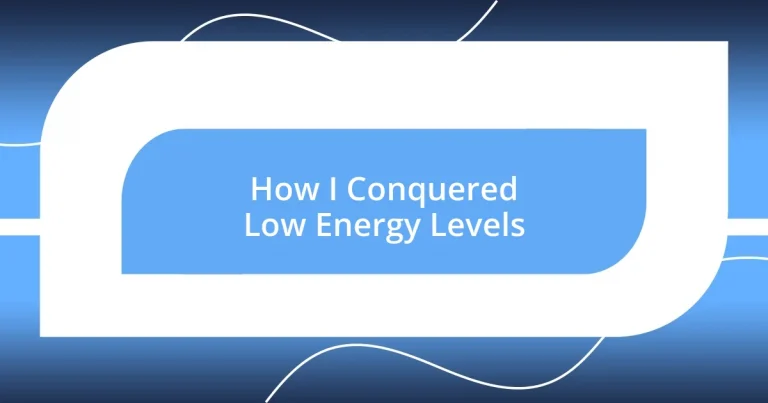Key takeaways:
- Identifying causes of fatigue, such as poor diet and emotional stress, is essential for improving energy levels.
- Incorporating daily energy boosters like physical activity, hydration, and mindfulness practices can significantly enhance overall energy.
- Tracking progress and making adjustments based on personal experiences helps in discovering effective strategies for sustaining energy long-term.
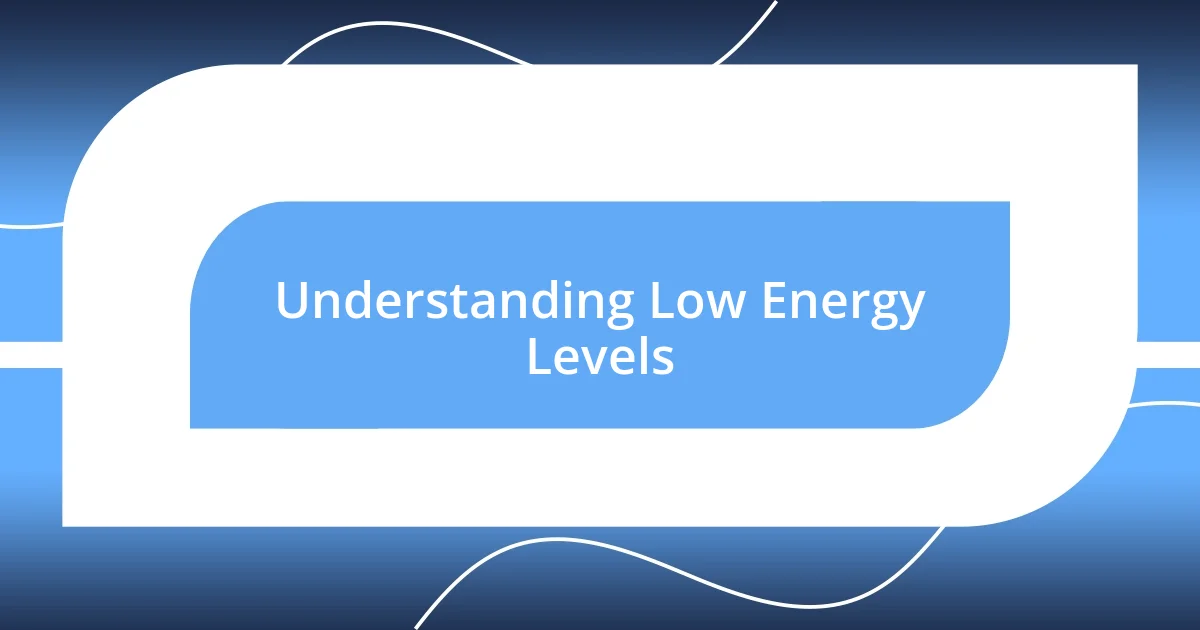
Understanding Low Energy Levels
Low energy levels can often feel like a heavy blanket, smothering motivation and enthusiasm. I remember dragging myself through my days, wondering why even simple tasks felt so overwhelming. When I finally took a moment to reflect, I realized that various factors could deplete our energy, from lack of sleep to emotional stressors that we often overlook.
I’ve noticed that sometimes it’s not just about physical exhaustion. Emotional drains, like unresolved conflicts or anxiety, can zap our energy faster than any late-night Netflix binge. Have you ever experienced that moment when your mind races, yet your body feels paralyzed? It’s a frustrating dichotomy, and understanding this interplay was crucial for me in grasping my own energy struggles.
It’s fascinating how our daily habits can significantly influence our energy levels. For example, I once thought that my caffeine fix was the solution – until I found myself crashing harder than before. How often do we rely on temporary boosts while ignoring the root causes of our exhaustion? By taking a deeper look at my lifestyle choices, I began to unravel the layers of what truly impacts my energy, paving the way for a more balanced approach.

Identifying Causes of Fatigue
Identifying the causes of fatigue is often a more complex endeavor than it initially seems. I once thought long hours at work were solely to blame for my tiredness, but I later discovered how my diet played a pivotal role. A friend of mine, an avid runner, shared that after making simple changes to his meals, he experienced a remarkable increase in energy. It made me realize how closely our physical state is tied to what we consume and how we feel emotionally.
Here are some common causes of fatigue that I identified:
- Poor sleep quality or insufficient rest
- Nutritional deficiencies, such as low iron or vitamin D
- Sedentary lifestyle and lack of physical activity
- High levels of stress or emotional strain
- Underlying medical conditions, like thyroid disorders or diabetes
- Excessive caffeine or sugar intake, leading to energy crashes
Reflecting on these factors allowed me to pinpoint specific changes I needed to make, leading me toward a smarter, more energized life. It’s all about connecting the dots between these elements and understanding how they interact with one another.
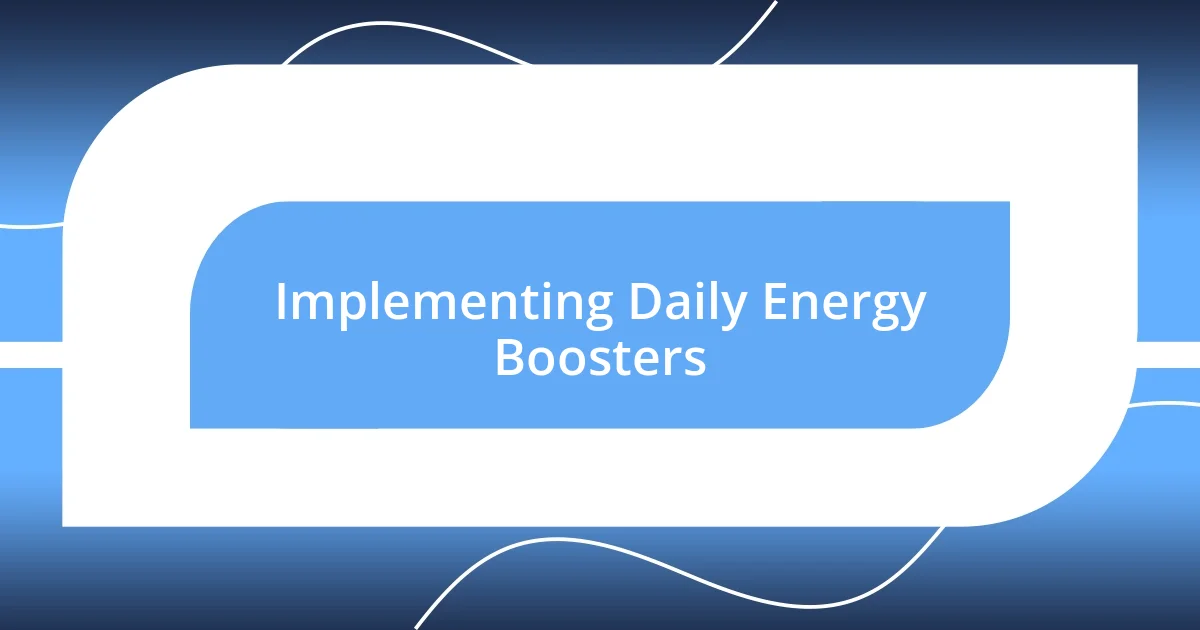
Implementing Daily Energy Boosters
Implementing daily energy boosters has been a game-changer for me. I remember the days when 3 p.m. would hit, and I’d feel like I was trudging through mud. I started small, incorporating a brisk walk or a few minutes of stretching into my mid-day routine. These simple bursts of movement not only lifted my spirits but also restored my focus. It’s incredible how a little physical activity can awaken the body and mind.
Another energy booster that profoundly impacted me was staying hydrated. I used to underestimate the power of plain water, thinking I could compensate with my morning coffee. But once I started tracking my water intake, the difference was palpable. I felt more alert and less sluggish. Have you ever noticed how even a slight dehydration can drag you down? It’s truly eye-opening to realize that something as simple as drinking enough water can change the game.
I also discovered the benefits of mindfulness practices. Taking even just five minutes to meditate or practice deep breathing brought me clarity and calm. It’s as if I pressed a reset button on my mental state. The chaos of daily life can cloud your focus, but those moments of stillness can boost energy levels in ways that are often overlooked. For anyone feeling drained, I highly recommend exploring mindfulness techniques as a daily energy booster.
| Energy Booster | Description |
|---|---|
| Physical Activity | Short walks or stretches that can uplift mood and energy. |
| Hydration | Regular water intake helps combat fatigue and improve alertness. |
| Mindfulness | Short meditation or deep breathing to reset mental clarity and calm. |
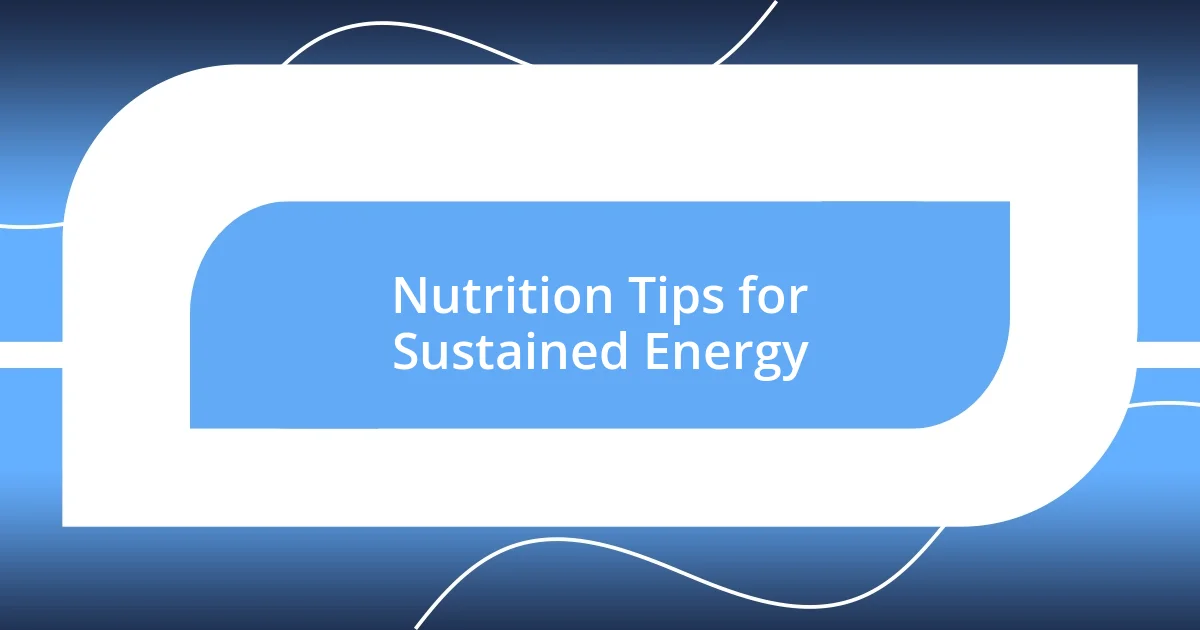
Nutrition Tips for Sustained Energy
In my journey to enhance my energy levels, nutrition proved to be a crucial pillar. I began to focus on incorporating whole foods into my daily meals—things like leafy greens, colorful vegetables, and lean proteins. I remember the first time I swapped out processed snacks for fresh fruit. The immediate boost in energy was almost thrilling; it made me realize how what I was putting into my body could transform my day.
I also learned the importance of maintaining balanced meals. Initially, my lunches were often just quick fixes, leaving me feeling drained by the afternoon. When I started combining carbs, proteins, and healthy fats—like quinoa with roasted veggies and grilled chicken—my energy levels became more stable. Have you ever noticed how a well-rounded meal can keep you going longer without those annoying crashes? It’s such a simple adjustment, yet it made a world of difference for me.
Another eye-opener was the timing of my meals. I used to skip breakfast, thinking it would help me cut calories, but I realized later that it left me feeling sluggish and irritable by mid-morning. Once I committed to a hearty breakfast—often oatmeal topped with nuts and fruit—my mornings transformed. The sustained energy I felt was so empowering, leading me to tackle tasks with renewed vigor. It’s fascinating how a shift in when and what we eat can significantly impact our daily energy levels.
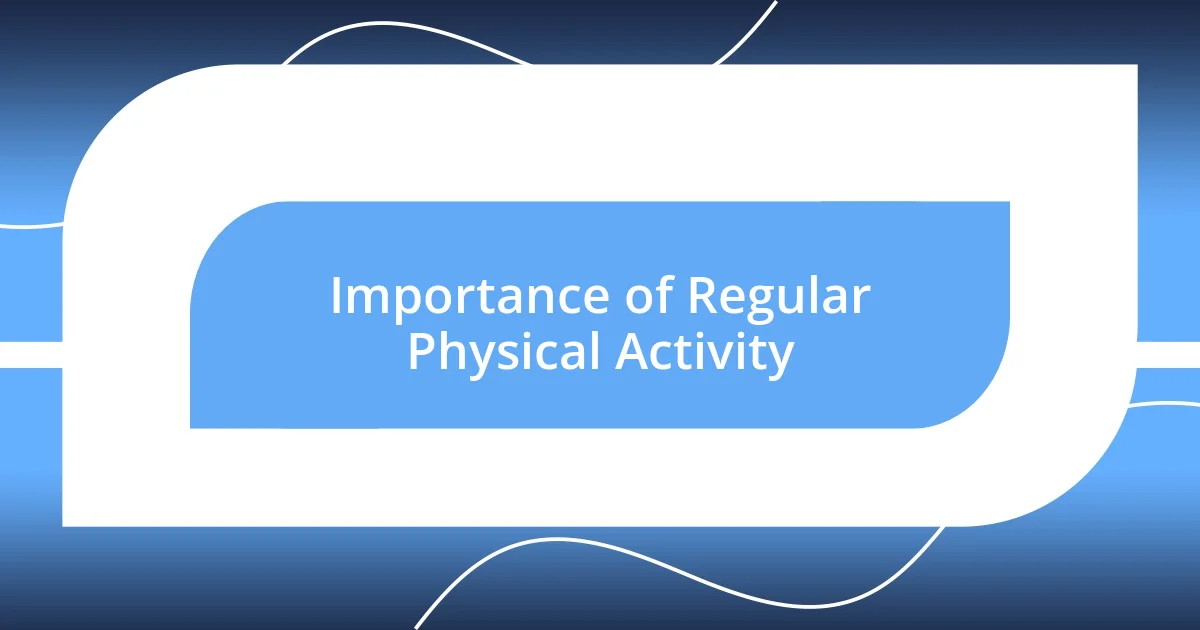
Importance of Regular Physical Activity
The role of regular physical activity in enhancing energy levels cannot be overstated. I recall a time when I believed that conserving energy meant doing less. Yet, after incorporating consistent workouts into my schedule, I found the opposite to be true. Just 20 minutes of exercise, whether it was jogging or dancing, made me feel revitalized and ready to tackle my day. Isn’t it remarkable how moving our bodies can actually create more energy rather than drain it?
I used to dread the thought of hitting the gym, associating it solely with grueling sessions. But one day, I decided to try a fun dance class. The joy I felt dancing—laughing and sweating alongside others—transformed my perspective on exercise. Engaging in activities I genuinely enjoyed brought a sense of fulfillment that I had never experienced before. Have you ever found your favorite way to move your body? It can make all the difference in sustaining your energy levels!
Even short bursts of activity throughout the day can be a game-changer. For instance, I started taking the stairs instead of the elevator and noticed a subtle shift in my energy. These little changes don’t just keep me active; they refresh my mind during those sluggish moments. It’s fascinating to think that just a bit of movement can increase blood circulation and oxygen flow, promoting mental clarity. Why not give it a shot? You may be surprised by how invigorated you feel with just a little extra movement in your day.

Mindfulness Techniques for Energy Management
Mindfulness techniques have been a revelation in managing my energy levels. I vividly remember the first time I dedicated a few minutes to mindful breathing. Sitting quietly, focusing solely on my breath, I felt my mind clear and my body relax. It’s amazing how just pausing and tuning into oneself can reinvigorate your spirit. Have you ever taken a moment to just breathe deeply and notice how it affects your day?
Incorporating mindfulness into my daily routine was another significant change. I started setting aside time each morning for meditation. It became my sacred space to recharge before facing the day. The sense of calm I cultivated helped me approach challenges with a clearer mind. It’s surprising how this simple practice enhances not just mental energy but also emotional resilience. I often wonder, how does such a short time investment yield such profound benefits?
Gratitude journaling became my favorite mindfulness practice. Each evening, I would jot down three things I was thankful for, and it shifted my focus from fatigue to positivity. On days when my energy felt particularly low, this practice helped me identify moments of joy and motivation I might otherwise overlook. It’s like shining a light on the good, which in turn feeds the soul with renewed energy. Isn’t it interesting how our minds can impact our energy, simply by changing what we focus on?
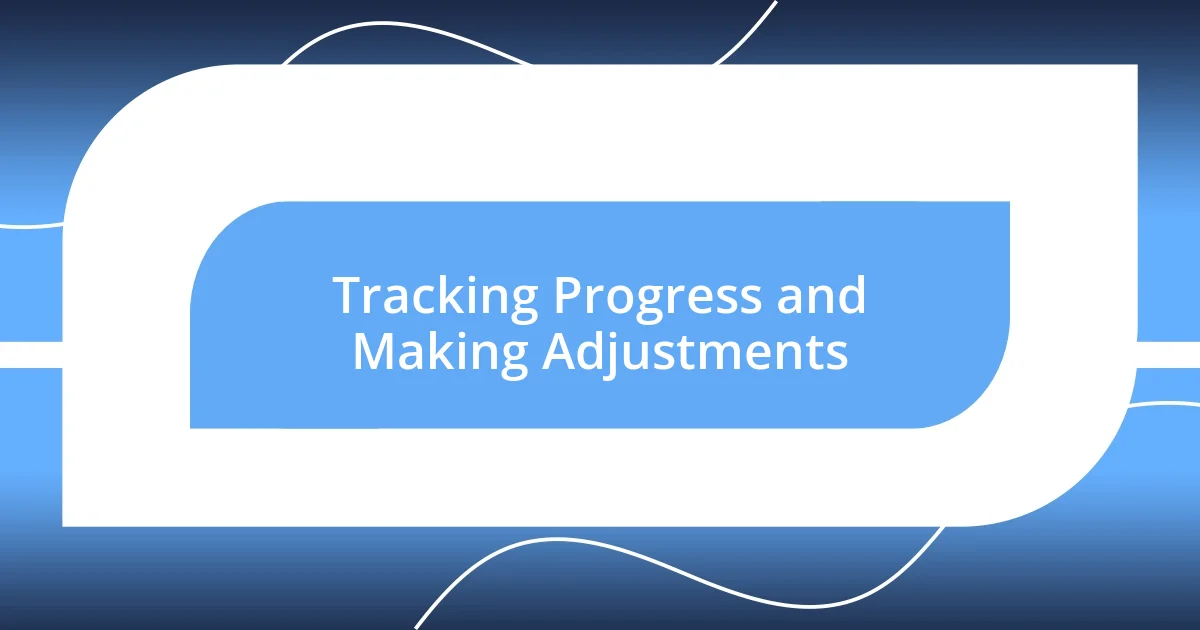
Tracking Progress and Making Adjustments
Tracking progress has been essential for me in understanding the factors that influence my energy levels. At first, I relied on a simple notebook to jot down how I felt after different activities throughout the day—be it a morning jog or an afternoon stretch. Looking back at those notes, I discovered trends and patterns that helped me make informed decisions about my routine. Have you ever tried reflecting on your feelings after a workout? It can reveal so much about what truly energizes you.
When I noticed that certain exercises boosted my mood significantly, I shifted my focus to those activities. For instance, swapping evening yoga for a midday brisk walk provided me with a burst of energy I never anticipated. Keeping track isn’t only about numbers; it’s about tuning into those moments of joy and vigor. What adjustments have you made when you discovered something didn’t resonate with you? Sometimes, it’s about being brave enough to pivot and embrace a new direction.
Experimentation is key, as I learned through trial and error. I started using an app that allowed me to monitor my physical activity, and I was surprised by how motivating it was. Setting weekly goals and then assessing my progress made the process feel like a fun challenge rather than a burden. After a month, not only did I notice tangible changes, but I also felt a renewed sense of achievement that fueled my motivation. How has tracking your progress influenced your energy journey? It’s incredible how small adjustments can lead to significant, positive shifts in our daily lives.












